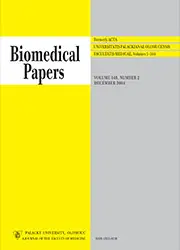Multiple sclerosis is a serious neuroimmunological disease and data on its incidence and treatment are systematically and longitudinally evaluated by the national ReMuS registry. Trends in the treatment of patients in the Czech Republic were discussed by Dominika Št'astná, MD., Ph.D. from the General University Hospital in Prague in his article published in the journal Biomedical Papers.

Stastna, D., Drahota, J., Lauer, M., Mazouchova, A., Menkyova, I., Adamkova, J., Ampapa, R., Dufek, M., Grunermelova, M., Hradilek, P., Kubala Havrdova, E., Mares, J., Martinkova, A., Pavelek, Z., Peterka, M., Recmanova, E., Rockova, P., Stetkarova, I., Stourac, P. , Vachova, M., Horakova, D. (2023). The Czech National MS Registry (ReMuS): data trends in multiple sclerosis patients whose first disease-modifying therapies were initiated from 2013 to 2021. And Biomedical Papers. Palacky University Olomouc. https://doi.org/10.5507/bp.2023.015 PMID: 37114703
Abstract
Objectives: The treatment strategy for multiple sclerosis is changing in the Czech Republic. According to data from 2013-2021, the proportion of patients starting treatment with highly effective disease-modifying therapies is increasing. In this analysis, we describe the current trends in patients with multiple sclerosis (MS) starting their first disease-modifying therapy (DMT) between 2013 and 2021. A secondary aim was to present the history, data collection and scientific potential of the Czech national MS registry (ReMuS).
Methods: First, we used descriptive statistics to analyze data from patients who initiated their first DMT, either baseline (including dimethyl fumarate) or high-efficacy DMT (HE-DMT) for each of the years analyzed. We also provided a detailed description of the history, data collection, completeness, quality optimization procedures, and legal framework of the ReMuS registry.
Results: Based on the dataset as of 31 December 2021, the total number of monitored MS patients in ReMuS increased from 9,019 in 2013 (reported from 7 of the 15 MS centres) to 12,940 in 2016 (from all 15 MS centres in the Czech Republic) to 17,478 in 2021. In these years, the percentage of patients treated with DMT in the registry ranged from 76 to 83 %, but the proportion of patients treated with HE-DMT changed from 16.2 % in 2013 to 37.1 1 % in 2021. During the follow-up period, a total of 8,491 patients who were not yet treated received DMT. The proportion of patients (all MS phenotypes) initiating HE-DMT increased from 2.1 % in 2013 to 18.5 % in 2021.
You can read the full article in English on the magazine's website Biomedical Papers.

